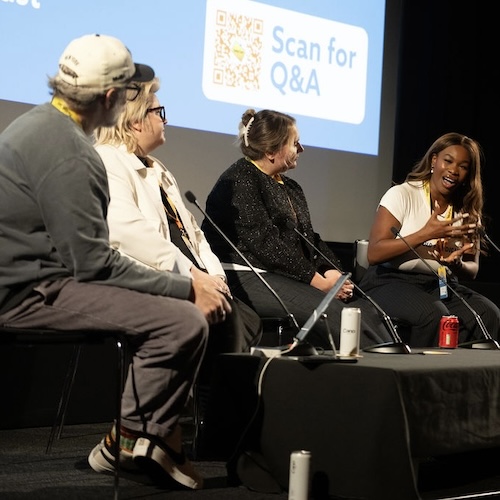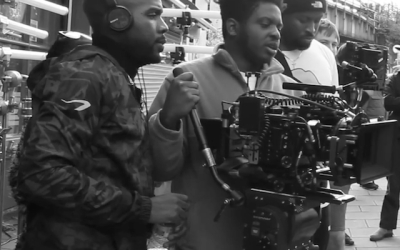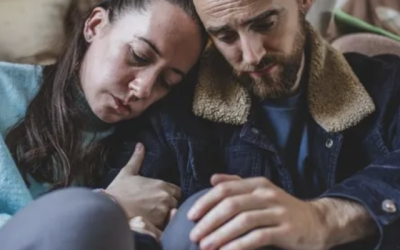The lines are blurring between audio and video content, with a growing number of podcasts being developed into TV shows, and a burgeoning market in spin-off podcasts from successful TV formats too – many of which are filmed for visual versions.
A panel at the TellyCast Digital Content Forum this week pondered what it all means. Moderator Jamie East, head of podcasts at DMG Media, was joined by Janine Smith, head of creative and culture at Channel 4; Suzy Grant, head of visualised podcasts at Listen; and podcaster, broadcaster and influencer Jackie Adedeji.
Grant talked about The Traitors: Uncloaked, a review companion show to one of the biggest format hits in recent memory.
“It’s had the most successful journey across the BBC, getting people from TV into podcast, and people from podcast back into TV,” she said. “We very comfortably beat Love Island every night that we broadcast. The audience want to come with us… It’s something new, it’s something special, and it’s what the audience want.”
While Uncloaked enjoyed success on the BBC’s iPlayer, the audio-only version also outperformed expectations on the BBC Sound platform, including attracting a youthful audience. “You can see the user journey working really well,” said Grant.
Adedeji’s first podcast hit came with a show talking to women about their relationship with their breasts, which was then developed into a documentary – ‘My Big Boobs: Untold’.
“The podcast was the pilot, the showreel,” she said, describing it as a much more compelling thing to show broadcasters than a cold pitch. “Had I not done that podcast I maybe would not have been able to do my documentary.”
However, Adedeji now has multiple ways of testing out new ideas and formats. “If I had an idea for something, I would talk about it on TikTok and see if it had an audience, and then I would have the numbers,” she said. “I would still pitch [it to broadcasters] but I would pitch with evidence now. It’s really easy: you can see numbers, you can see engagement.”
Smith talked about Channel 4’s strategy, which involves putting its podcasts on a variety of platforms, rather than trying to force people to listen on its own properties.
“What we’ve been trying to do is look at our audience and where they consume content. It’s much harder to drive an audience to an owned platform than to serve that audience on the platforms they’re already on,” she said.
Audio podcasts from Channel 4 have also started becoming “filmed discussion shows” by being put on YouTube. “We get 10 times the volume of reach by doing that,” she said. And now those filmed episodes are now crossing to the E4 TV channel. “We see a whole lot of different audiences across that consuming the content in a way that is appropriate for them.”
Grant explained how Listen varies its approach for different podcasts. Besides The Traitors: Uncloaked it also worked on Rivals: The Official Podcast, which accompanied the Disney+ adaptation of Dame Jilly Cooper’s bonkbuster book.
The episodic podcast format suits unscripted shows, where new episodes of the audio show can be released after each TV episode airs, to pick up on the key points and interview participants. For scripted shows – particularly those whose episodes drop at once for binge-viewing – this approach may not make as much sense. “You’re not going to stop your binge-viewing to listen…”
The panel also considered how podcasters relate to their listeners. “I’m talking to a community is how I’m seeing it. With a podcast it’s ‘you guys!’” said Adedeji. “It’s feeling like you’re part of a collective, like you’re part of something. So I’m talking to everyone. They’re all my besties, basically, and I think people like feeling like that, because it makes them feel less alone.”
There was also a discussion about what makes a successful podcast. A really strong producer is key, said Grant, with a strong marketing team and strategy just as important: “If people can’t find you, no one’s going to listen” – especially if your show doesn’t have a big broadcaster throwing promotional weight behind it.
“The fundamental difference between TV and podcasting is that in podcasting the lines are blurred in every role,” added East. “Regardless of how big the podcast is, the teams are inevitably smaller than in TV, and everyone is expected to muck in.”
Finally, each panelist was asked to choose a podcast that they’d love to see made into a prime-time TV format, or vice versa. Smith said she’d love to see country-music podcast Cocaine & Rhinestones turned into a TV show, while Grant is keen on a podcast for The Real Housewives of Salt Lake City. “I’d love to exec it. Send me to Utah!” she laughed.
Meanwhile Adejeji chose Lily Allen and Miquita Oliver’s ‘Miss Me?’ podcast as being ripe for a transfer to TV. “Millennials do miss these conversations, these nostalgic moments,” she said, with East agreeing that the show has been such a success that a TV treatment seems inevitable.





